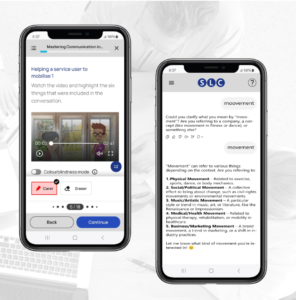
SLC win Ufi grant to develop AI language learning app for social carers
We’re delighted to have won a grant from Ufi VocTech Trust to develop an AI-driven technology solution that provides cheap phone-based language and communication skills

The GMC uses the following evidence to demonstrate that a European doctor qualifying from one of the member states of the European Economic Area (with the exception of the UK) has sufficient English language skills to practice safely and effectively in the UK.
Doctors should have an overall score of 7.5 in the academic version of the International English Language Testing System (IELTS) from the last 2 years. As part of this, a doctor must score a minimum of 7.0 in each of the four papers: reading, writing, listening and speaking. These scores must be achieved in one sitting of the test.
This, in practice, is how most overseas doctors demonstrate their knowledge of English. The GMC may accept IELTS test scores that are more than 2 years old if a doctor can show that their English language skills have not deteriorated in that time. They may have worked in a country where English is the first language for example, or they may have taken a postgraduate course of study which has been taught and examined in English.
While IELTS is currently the only test recognised by the GMC, the organisation is open to alternatives in the future which can be shown to be reliable and appropriate tests of a doctor’s English language skills.
The GMC requires the PMQ to have been taught and examined in English and to be from the last 2 years. As part of this, at least 75% of the doctor’s clinical interaction, including personal contact with patients, relatives and other healthcare professionals, must have been conducted in English
Where the PMQ is not so recent, then the GMC requires clear evidence that the doctor has extensive experience practising in English over the previous 2 years in a country where English is the first language, to include employer references.
Practice may be clinical, teaching, management or research-based. The GMC will take into account whether this is continuous or periodic, and ensure that the practice uses the knowledge, skills, attitudes and competences gained in a medicine degree and any further study.
The GMC will explore which test was used and what requirements were met. If the test pass is over 2 years old, then the GMC may ask for evidence that demonstrates the doctor’s experience of practising for the preceding two years, as outlined above in evidence type 2.
The GMC requires written confirmation from the UK healthcare organisation that an offer of employment has been made, and that the healthcare organisation must be a designated body. The GMC may also ask for evidence of a doctor’s English language skills along the lines outlined above in Evidence Types 1, 2 and 3.
As part of this process, the GMC requires the appointing clinician to complete an English language reference form detailing the applicant’s skills in reading, writing, listening and speaking, and how these were assessed during the recruitment process. The appointing clinician must then get confirmation from the Responsible Officer for the employing organisation that they endorse the recruitment processes the employer has in place to ensure that the applicant has the necessary knowledge of English to practise safely in the UK.
GMC Guidance for European Doctors
Universities not accepted as evidence of English language proficiency – in this case an IELTS score is required
Get your monthly updates and latest materials on Medical English

We’re delighted to have won a grant from Ufi VocTech Trust to develop an AI-driven technology solution that provides cheap phone-based language and communication skills

We’re delighted to announce a partnership with leading Medical English app, Doxa.
